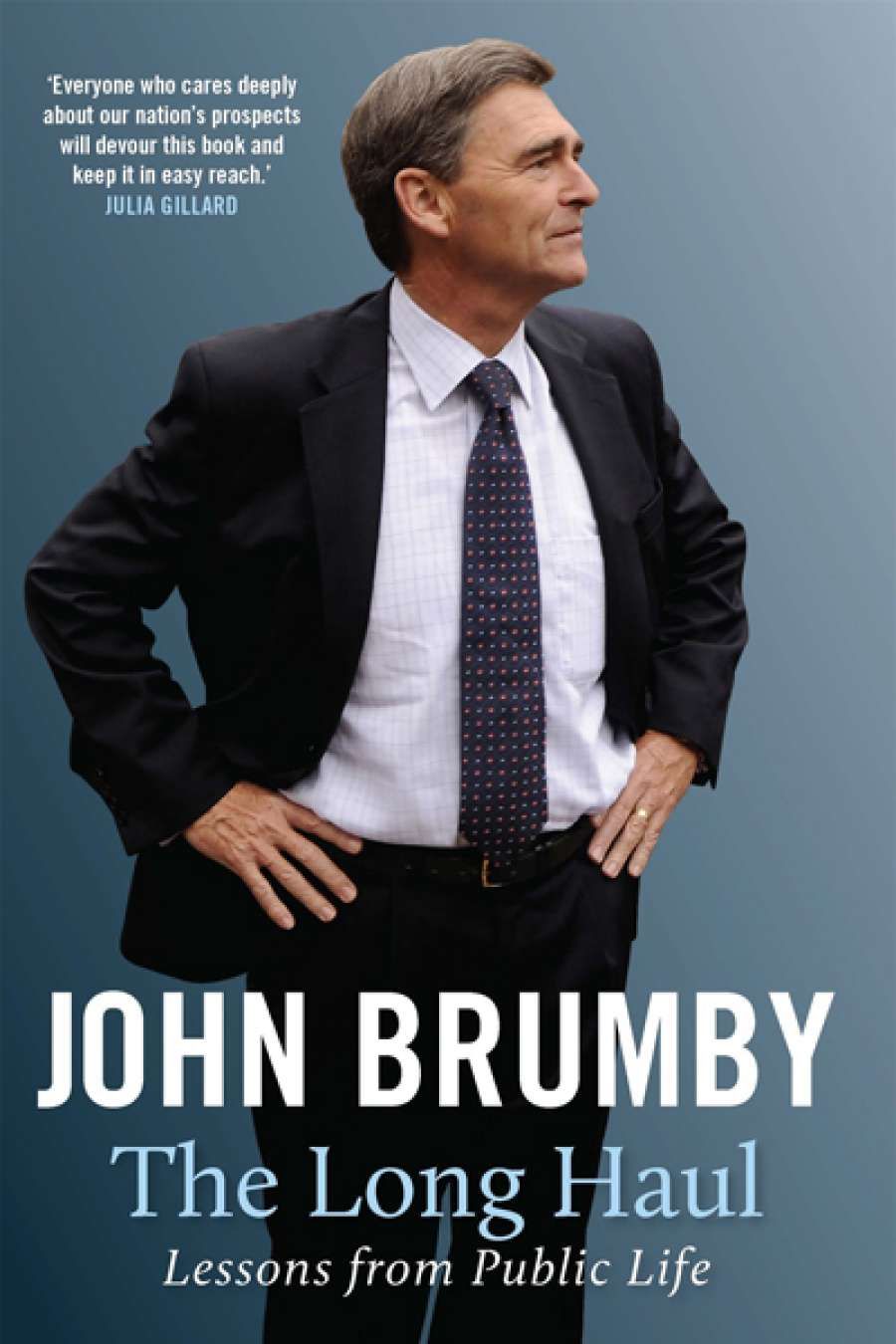
- Free Article: No
- Contents Category: Biography
- Custom Article Title: John Byron reviews 'The Long Haul' by John Brumby
- Review Article: Yes
- Online Only: No
- Book 1 Title: The Long Haul
- Book 1 Subtitle: Lessons from Public Life
- Book 1 Biblio: Melbourne University Press, $34.99 pb, 270 pp, 9780522868531
This makes for an unedifying apologia. While it is vastly different from the vitriolic onanism of The Latham Diaries (2005, also Melbourne University Press), Brumby's Self-Portrait in White Hat stretches credibility. It simply beggars belief that anyone could become, serially, a member of the House of Representatives, a member of one then the other house of state parliament, and then Leader of the Opposition essentially at the invitation and handiwork of others. The sheer density of Brumby's protestations of blamelessness undermines their reliability, serving only to enhance suspicions – especially once the effect becomes comic in repetition.
This fifty-five page treatise is only the first of twenty-one chapters, yet it constitutes twenty-three per cent of the substantive text. The book eventually recovers, but this opening section should have been drastically compressed or even excised, its choicest cuts relocated to strengthen the lessons that follow. For example, Brumby's account in this section of Black Saturday, when Victoria burned in February 2009, is both moving and instructive. It anticipates a short, late chapter about the aftermath, also written with sensitivity, which eloquently demonstrates how policy implementation can be the expression of a community's sorrow and compassion. Taken together, this is the best writing in the book.
The nineteen chapters, or 'lessons', range in length from three to sixteen pages, half numbering seven pages or fewer. Most are worthy and sensible, occasionally well illustrated by sharp anecdote, but some are so brief that they struggle to convey any insight without recourse to platitude. Can two-and-a-half pages of type labelled 'Encourage the Frank and Fearless' say much that is not conveyed in its heading?
 John Brumby with Hillary Clinton, 2010 (U.S. Department of State via Wikimedia Commons)
John Brumby with Hillary Clinton, 2010 (U.S. Department of State via Wikimedia Commons)
The longer offerings are more your meat and potatoes, although even they are frequently served beneath condiments of questionable dietary value. The opening paragraph of 'Government is a Team Effort' is typical:
No one can lead a state or a country – at least not for long – unless they can first lead a team. Further, good team leadership begins with good team membership. A leader is only as good as the team, and a team is only as strong as its members. A good leader also needs to be part of the team – that is, to put the interests of the team before personal ambition.
All undeniably true, but need it be so stultifying? In this instance, Brumby immediately offers a pithy federal example of disastrous behaviour, so the chapter recovers quickly. He then proceeds with illustrated reflections on the importance of common courtesy (a rare but welcome asset in politics), the utility of governance education, and the value of sharing time with colleagues. This is the pattern: there is much nourishment to be found throughout the book, some of it even piquant, but you constantly have to push aside the stodge.
Chapters on accountability, regional inclusion, service delivery, and education are among the best lessons; they contain a sober appraisal of events and subtlety of thought about complex issues, built around a methodical framework. Brumby is a serious and capable thinker, and he offers original ideas for reform, such as reverting to centralised arbitrated industrial relations for the public sector, and the establishment of an independent intergovernmental secretariat to improve the functioning of the Federation. For my money, the account of prosecuting abortion law reform ('Conscience Can Work') is his best single extended anecdote on the art of governing, and his rumination on creativity and a flourishing society ('The Footy and the Synchrotron') is the philosophical highlight.
'Nearly everything that went wrong was someone else's fault'
However, Brumby saves his best thinking for last, with a final chapter providing an overview of the prospects for Australia and a proposal for how they might be maximised. This is where Brumby's orderly method excels. Exploiting his broad policy experience and good access to current data, he recommends a strategic approach based on shrewd investments in people and technology, a sober acknowledgment of our circumstances (instead of indulgence in the comforts of mythology), and a willingness to form open partnerships with rising regional powers. This is not a comprehensive survey – his brief on geopolitical transition focuses exclusively on business opportunity, for example, ignoring security and resource considerations – but he lays out a sound framework for thinking together about how best to pursue a safe, fair, and prosperous future in a rapidly changing world. It is a significant contribution.
This is a worthwhile complement to the field, especially once the first chapter is apprehended as an ectopic memoir and the 'lessons' as a de facto lecture series. Brumby is methodical in his approach (possibly to a fault), but he makes his point most elegantly and poignantly when he lets his guard down and permits us a glimpse of the human being inside the suit.


Comments powered by CComment